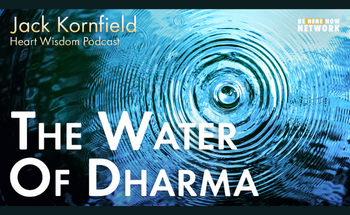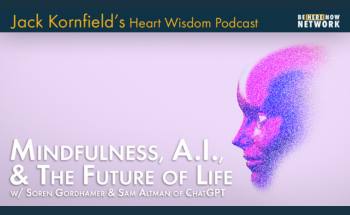Anger is easy to see, and greed is more subtle, but delusion is the hardest.
All the accompanying mind states get cloudy, confusing. — Ajahn Chah
Denial arises when we don’t believe what is actually in front of our eyes. On a personal level, we can deny problems at work, difficulties in our marriage, depression, or addiction—as if denial will make them go away. With denial, we can start a love affair and actually believe that the romantic intoxication will last forever. We can think that the stock market will only go up and never go down. Many of us learned denial early. We were taught to ignore family secrets. In denial, we become frightened to tell the truth to one another.
Denial can also function collectively. Buddhist psychology describes how whole societies can be manipulated into violent upheaval by ignorance, racism, and fear mongering. The endless consumer advertising and scary propaganda flooding us can deliberately foster anxiety and reinforce our economic and political delusions. Collective delusions can operate for years before we awaken to the cost: we continue to deny our environmental crises, the continuing rise of racism and false nationalism, and our participation in the enormous global weapons industry. In looking for security, we somehow ignore the fact that 10 percent of the world’s military budget would feed every hungry person on earth.
Sometimes we can cling to delusions even in the face of obvious danger. I like the story about a man who is driving down the highway when he hears a safety alert on the radio: “Anyone driving north on Interstate 187 should use great caution! There is a car driving on the wrong side of the divided highway.” The man glares through his windshield and mutters, “There’s not just one car driving the wrong way. There are hundreds of them.”
My teacher, Ajahn Chah, said, “Anger is easy to see, and greed is more subtle, but delusion is the hardest. All the accompanying mind states get cloudy, confusing.” Fortunately, with mindfulness, we can see through denial. Ajahn Chah explained, “Look for moments of clarity. Keep to your experience, not your confusing thoughts. Learn the difference.”
This is the gift of mindfulness training. Through our repeated practice of loving awareness, even amidst difficult times, we can take a moment to slow down and remember to breathe. We can quiet our mind, listen to our body and heart, and see the world with greater clarity and wisdom. Our willingness to see with honesty and compassion and speak the truth is powerful medicine which can bring benefit to all.





